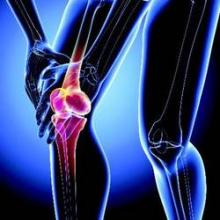Patients with knee osteoarthritis and poor sleep habits suffered greater central sensitization to pain than other individuals, especially if they tended to ruminate about their pain, a case-control study found.
The study is the largest to date to examine sleep, catastrophizing, and central sensitization in knee osteoarthritis, said Claudia Campbell, Ph.D., of Johns Hopkins University, Baltimore. “While we were underpowered to fully examine all possible data described, we hope that these data serve as a platform for future studies to adequately power themselves and explore potential differences.”
Patients with osteoarthritis often report poor sleep, and studies show that many of these patients also have central sensitization, or hyperexcitability of nociceptive nerve pathways, a phenomenon that tends to amplify and prolong pain. Catastrophizing – a “persistently negative cognitive affective style” in which patients feel helpless, and magnify and ruminate about their pain – predicts worse pain outcomes in osteoarthritis and other painful conditions, the investigators noted (Arthritis Care Res. 2015 June 4 [doi: 10.1002/acr.22609]).Dr. Campbell and her colleagues categorized 208 adults into four groups: those with insomnia and knee osteoarthritis, those with one or the other of the disorders, and those with neither condition (healthy controls). More than 70% of participants were female, and individuals with knee osteoarthritis were significantly older than the rest. The investigators matched the groups with knee osteoarthritis based on radiographic severity.
Quantitative sensory testing showed that patients with knee osteoarthritis and insomnia had significantly greater central sensitization, compared with healthy controls, the researchers reported. Low sleep efficiency (a measure of self-perceived sleep quality) was linked to heightened central sensitization, but only when patients scored more 7.4 on the 13-item Pain Catastrophizing Scale, they added. In all 56% of the sample met that threshold, as did 77% of participants who had both insomnia and knee osteoarthritis.
Central sensitization also correlated positively with clinical pain. “Clinical implications of these findings suggest that treatment options for osteoarthritis patients could include sleep and/or intervention for catastrophizing, both modifiable risk factors, [which] may aid in reducing central sensitization and decrease clinical pain,” the researchers noted.
The study was the first part of a randomized trial that is examining cognitive behavioral therapy for insomnia in patients with osteoarthritis.
The National Institutes of Arthritis and Musculoskeletal and Skin Disease and the National Institutes of Health supported the study. The investigators reported having no relevant conflicts of interest.


